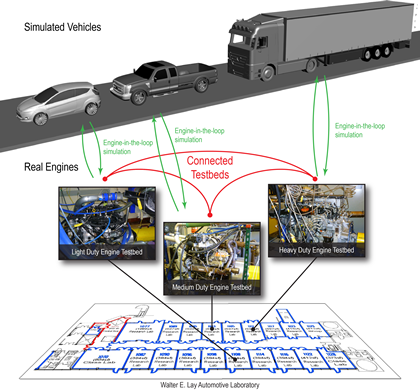Systems of Systems & Integration
Annual PlanConnected Laboratories for Connected Automated Vehicles
Project Team
Government
Denise Rizzo, Scott Heim, U.S. Army GVSC
Industry
Michiel van Nieuwstadt, Ford Motor Company
Student
Rasoul Salehi (post-doc), Xinyi Ge, Yifan, Weng, University of Michigan
Project Summary
Project began mid-2016 with a duration of one year.

Connected vehicles and automated driving are two technologies poised to transform mobility. Both technologies independently promise significant potential benefits in terms of fuel economy, and when the two technologies are synergistically combined, these benefits could be even more significant.
This project developed the core tools for a networked experimental platform to accurately assess the fuel economy of multi-vehicle formations of mixed vehicle types with multiple powertrain testbeds in the loop regardless of their geographic location.
In doing so, the project addressed the gaps that currently exist in fuel economy assessment between on-road experiments and fully simulation based evaluations. On the one hand, performing a controllable, repeatable, scalable, and affordable evaluation of the fuel economy of connected automated vehicle technologies is difficult in on-road experiments. On the other hand, simulation-based evaluations are not yet accurate enough. Realistic, cost-efficient, repeatable, and controllable solutions are needed to accelerate the evaluation and development of connected automated vehicles. This project filled this gap.
The overarching goal of this project was to create a connected testbed with multiple engines in the loop for realistic projections of fuel economy benefits of connected and automated vehicles in mixed traffic scenarios. Validation of key vehicle (non-engine) losses was performed through experiments at Mcity. Work continued after project completion with leveraged NSF funding. The created testbed will provide experimental capability for future ARC projects on connected automated vehicles. Using this testbed, ARC will have the capability to answer research questions such as what specific value V2X technology brings to an automated vehicle or cyber security related research questions.
Publications:
- Y. Weng, R. Salehi, X. Ge, D. Rizzo, M. P. Castanier, S. Heim, and T. Ersal, “Model-Free Speed Management for a Heterogeneous Platoon of Connected Ground Vehicles,” Journal of Intelligent Transportation Systems: Technology, Planning, and Operations, in press.
- “Connected Testbeds for Connected Automated Vehicles,” Invited Talk, 14th IFAC Workshop on Time Delay Systems, Jun 30, 2018.

